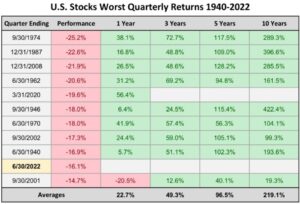We’re officially in a bear market; inflation is the highest it’s been in decades, and a recession may be looming. Everyone is feeling the pinch and anxious about the present and the future. But a nice dose of perspective can help when we’re feeling anxious. In this episode, we’ll get some perspective on the current situation and address some listener questions.
What History Shows Us
Consumer sentiment towards stocks and bonds is at a worrying low. People are not eager to be invested, and it’s hard to blame them with all the doom and gloom; THE SKY IS FALLING headlines we’re seeing.
The S&P 500 (When we talk about the market, we’re talking about the S&P 500, which is an index or a benchmarking guide. You can’t invest directly in the S&P 500, but there are ways to get close.) just had its worst quarter in 62 years, falling 16.1% in a three-month period.
That sounds bad, but it’s been worse and not long ago. In the quarter ending March 31, 2020, when the pandemic really started to take hold, the S&P 500 was down 19.6%. The S&P’s worst ever quarter was the one ending on September 30, 1974, when it was down a whopping 25.2%.
But as the cliche goes, it’s always darkest just before dawn. I don’t have a crystal ball, but I am very optimistic about being a long-term investor, especially when you invest in great companies.
Historical Perspective
Here’s what history shows us. After a significant decline, the first year sees an average increase of 22.7%. After three years, a 49.3% increase. After five years, a 96.5% increase. And after ten years, a 219.1% increase!
Things look scary now, and it’s easy to get bogged down with the thought that things will never be good again. But we and the market are resilient. It’s essential to have great companies and great brands in your portfolio because people will continue to buy from those companies and buy those brands. Maybe not as much as before, thanks to the pinch of inflation, but over the long-term, which is what counts when it comes to investing. And companies have pricing power; they can increase prices to offset losses.
The future looks bright! With a 219% increase, your money has tripled in ten years! If you left it in the market.
Bailing Out
A listener recently sent me two questions, and I think many people out there have similar questions right now, so I thought we’d cover them here. His 401(k) was down from $350,000 to $300,000, a big hit for anyone. He wondered if he should pull his money out and go to cash.
That’s a natural and common reaction to a bad market. Going to cash means you’ve taken some action, and doing something usually feels better than doing nothing, even if that something turns out to be a mistake.
Going to cash makes us feel safe. Our money is nice and safe in a savings account, no longer subject to the whims of the market! But let’s take the market out of it for a moment. The average interest rate on a savings account is 0.1%, a measly tenth of a measly percent! And inflation is currently 9.06%. Your “safe” cash is basically losing 9% of its value to inflation!
Market Perspective
Now let’s put the market back into the equation. Should you get out of the market, yes or no? If you chose yes, that creates another question. When do you get back in? Too often, people don’t. Jumping back in always seems too scary; it’s never the right time. And you lose out on all of those gains we detailed above.
The only person who gets hurt on a rollercoaster is the person who jumps off mid-ride.
Paying Off The House
The other question was whether or not to pull out $70,000 to pay off his house. He loved the idea of being debt-free, something we can all relate to, especially in turbulent times. And I do recommend little to no debt before retiring.
But taking that money out means taking it out during a bear market. So he’d have to sell more shares than if he had done this six months ago. And to have $70,000 free and clear, the amount needed to pay off the mortgage, he’d have to take out $100,000, the extra $30,000 being for taxes.
Taking out $100,000 in a bear market is obviously going to hurt his long-term compounding. And as he was planning to retire at 59 1/2, he wouldn’t be eligible for Social Security benefits.
My advice was an emphatic “No!” to both! But situations like these are where working with a CFP you trust can really pay off. With a few clicks of a button, we can model different situations and show different outcomes for various choices, offering a more comprehensive perspective for clients. Clients can see the repercussions of a decision before actually making that decision.
Listen in to hear where the markets are now and how they compare to other turbulent times. I will also be sharing important stats on the advantages of compound growth when you own great companies. When it comes to selling or pulling money out, I’ll share perspective on how that works when the market is down and discuss how to make intentional decisions with your money.
Listen to the Full Episode:
What You’ll Learn In Today’s Episode:
- What this past quarter looked like and how it compares over history.
- How confidence has changed in the stock market.
- The role of the S&P index and important stats we need to be paying attention to.
- The benefits of investing long-term in great companies.
- What historically tends to happen after bad quarters.
- Why knee-jerk reactions can be a problem.
- How to make intentional decisions for your money.
Ideas Worth Sharing:
“Consumer sentiment toward soared stocks and bonds is at a record low. We have dropped to historic lows when it comes to how confidence has dropped in the stock market.” – Jonathan Bednar
“I don’t know what’s going to happen in the future, but I do know that I’m incredibly optimistic when it comes to the future of being a long-term investor.” – Jonathan Bednar
“The market is resilient, we as people are resilient. If you have great companies in your portfolio, then my belief is that we as consumers are still going to consume from those companies and those brands.” – Jonathan Bednar
Resources In Today’s Episode:
- Jonathan Bednar: Email | Twitter | LinkedIn
- What The Wealth?! by Jonathan Bednar
Enjoy the show? Use the Links Below to Subscribe:






